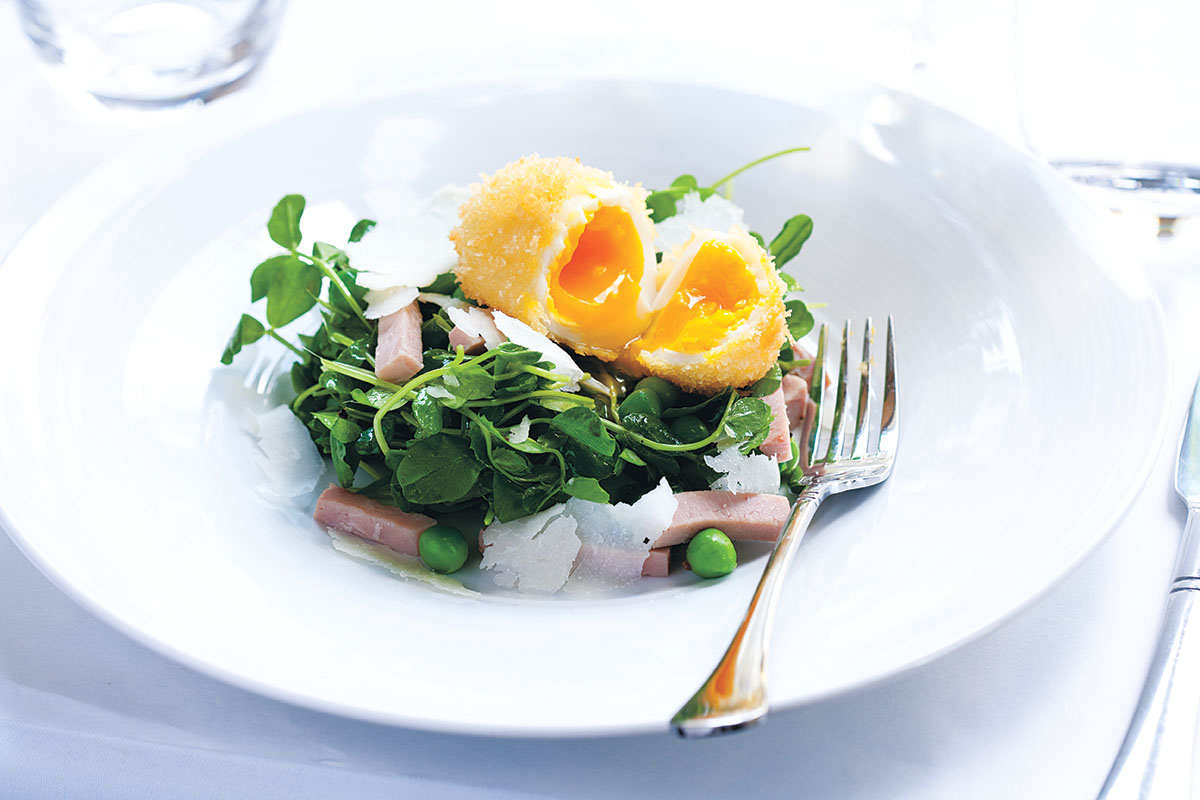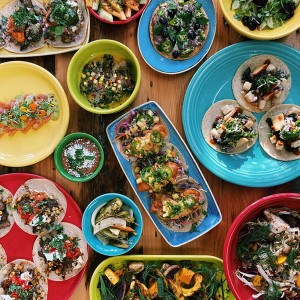Restaurant Review: Bergamot in Somerville
“I wish them well,” said my dining companion after a long and mostly satisfactory dinner at Bergamot. I can see why: It’s the kind of place you want to flourish.
Located in the old Evoo space on the Somerville-Cambridge line, Bergamot has so many parallels to its predecessor that it’s hard to believe the location is a coincidence, even if chef-owner Keith Pooler swears it is. And it’s hard not to compare them. Both are the creations of well-trained, experienced chefs who worked their way around town but longed to spread their wings. (Pooler has cooked at Excelsior, Harvest, and Scampo.) Both feel intensely personal. And both are the most appealing kind of dressy restaurant – designed for people who appreciate interesting food and a grownup experience without pomp or high prices. I have always felt comfortable in the high-ceilinged room with widely spaced tables, but Pooler and his business partner, Servio Garcia, have freshened the decor, so it’s brighter and more welcoming now.
Truth is, I found the food a little odd. But I felt the same way about Evoo when it opened, too. Like Evoo’s Peter McCarthy, Pooler starts from a French base and incorporates all manner of seasonal ingredients. But where McCarthy favors bold Asian sauces, hot peppers, and vinegary relishes, Pooler’s ingredients are subtler: saffron, warm Indian spices, and candied walnuts. Even sauces that sound domineering, like one made with “stinging nettle,” ramp, and garlic, turn out to be tame. The only intrusive note is the overuse of salt.
Under the direction of Garcia, previously of Craigie on Main and Casablanca, the servers were unusually well informed and in tune with the chef. As sympathetic as they were, though, I couldn’t agree when one said, “The chef makes sure you can taste every individual element on the plate.” I found there are often too many things on the plate to make sense of, and they’re fussy.
Yet two of the first courses were masterly. Pea green salad ($9) was elegant and fresh, with a truffle vinaigrette that broke my rule of despising anything with truffle oil (maybe because Pooler uses real truffle shavings). It coated the crisp Eva’s Garden greens like cream, and each element he added seemed just right: fresh peas, matchsticks of home-cured Berkshire ham, mild pecorino. I couldn’t resist the deep-fried soft-boiled egg on top – a Scotch egg without the sausage – from which tabs of panko dangled.
Ham and egg also appear in the sole escabeche ($12). The hard-boiled egg was finely diced, and the “shards” of prosciutto crackled like potato chips. The usually flavorless lemon sole was the star, fried and marinated in a balsamic vinaigrette with thyme and garlic. This escabeche avoided the acidic taste, heavy breading, and oily marinade of typical versions, and was both delicate and substantial.
Quite a few of the dishes, though, have one too many ingredients in the mix. Roasted beets with Shy Brothers curd ($10) came with an excellent puree of ground trimmings of roasted beets and walnuts, spooned into oval quenelle
shapes. But there weren’t enough of the beets, and with an excessively sweet dried apricot-ginger puree, plus garam masala-flavored walnuts, lemon zest, mint, and fried shiso leaves, there were too many little bits. I wanted to spread the beet puree on a freshly baked baguette, maybe topped with some of that farm cheese curd, and not bother with the frou-frou elements.
The hit ratio is even lower in the entrees. You have to like very slow cooking, a method Pooler uses too often. The point is to achieve succulence – and it often works. But it also means that fish and meat can acquire a sameness. Egg-battered halibut ($27) is supposed to mimic an omelet, Pooler told me, and in its own soft, golden way, it did. But his effort to cook the egg batter without allowing it to brown didn’t produce an appealing dish. The onion soubise under the fish didn’t add any punch, either.
I pick on that dish because it seems to characterize a number of the mains, which have good ingredients with lots of elements that don’t quite come off. A plate of monkfish medallions with artichokes, fiddleheads, fried capers, chorizo dust, and bread-garlic sauce ($24) suffered from tough fish and a surplus of ingredients; pan-seared scallops with roasted asparagus, maitake mushrooms, and green garlic sauce ($24) were salty but bland.
The specials from the “blackboard menu” – $39 for three courses – were a better bet. Roast pork shoulder had skin that was a bit rubbery, but the gigantic white corona beans with bacon were practically meat themselves. A wonderful lamb hash on a Monday was less a hash than a ragout, presented with a trove of spring vegetables including asparagus, fava, and peas, plus onion soubise. I wished everything had been that simply and clearly conceived.
I found only one entree on the regular menu I’d want again: braised rabbit leg with fresh peas, portobello mushrooms, and parsley pappardelle ($19). The meat was fine, but the pasta was terrific. It was a French approach (stock, butter, leeks, and thyme in the sauce), but made better than any pasta dish I’ve had in France.
Let me linger on Pooler’s expertise with vegetables: Mostly they’re included with the main courses, like bright-flavored peas and carrots with the rabbit, and roasted asparagus with the scallops. Sometimes they’re on the blackboard menu, like a sensational side of fiddle-heads with fingerlings and pancetta ($7). When he roasts vegetables, he uses high temperatures so they’re caramelized outside and creamy within.
Bergamot has the luxury of a full-time pastry chef, and Stacy Mirabello produces desserts that are lovely to look at, particularly “that grapefruit dessert” ($8): meticulously sectioned ruby red grapefruit and white wine sabayon with a St. Germain sorbet, seasoned with cilantro and pink peppercorn. It coheres into a refreshing whole. So does Meyer lemon steamed pudding ($9), with the unexpected addition of quinoa, both toasted and in a crunchy tuile; the accompanying coconut sherbet has a wonderfully smooth texture. Carrot cake
($9), unfortunately, tastes like another steamed pudding, though it isn’t meant to. Guajillo chili-chocolate pave ($10) features marvelously gritty, chili-infused Taza chocolate, a malty milk-stout ice cream, apricot confit, and crushed pretzels. It’s successful, if something of an oddity.
Bergamot is like that: odd, but appealing, and almost always agreeable. Opt for the blackboard menu and order a couple of seasonal sides, and you’ll wish Bergamot well, too.
Bergamot, 118 Beacon St. Somerville, 617-576-7700, bergamotrestaurant.com



